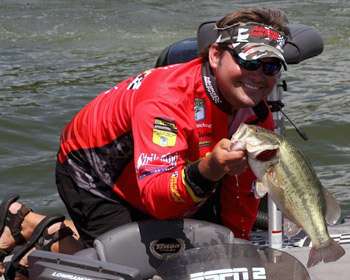
Have you ever had a weekend bass fishing trip in which everything seemed to be coming together as you envisioned it — only to see the beautiful pattern you had pieced together evaporate overnight due to an unforeseen rise in water levels? How did you adapt?
Conventional wisdom says that in rising waters, bass tend to follow the water up. If they are in shallow to mid-level depths, they'll head closer to the "new" bank as the water inches higher. According to Elite Angler Greg Hackney, that's not always true.
The Gonzales, La., pro notes that some fisheries, particularly on tidal estuaries and river systems, fluctuate frequently. In these situations, bass seem to know that the water level will fall just as quickly as it rose. "During quick and sudden flooding conditions, the fish will move up the bases of trees and spread out into the limbs. If they are positioned on docks or other cover, they will just move up on that cover," Hackney reveals.
"When the water comes up real fast, it's almost like the fish don't want to commit to following the water up the bank in case it turns around and recedes just as quickly." On most large inland reservoirs there isn't much threat of severe flooding; however, it's not at all uncommon for a few inches of rain upstream to create at least a foot of runoff into the lake. If the fish are off the bank in deeper water to begin with, Hackney believes they won't move at all.
"It's almost like they don't really realize that the water is rising unless it muddies up and forces them out of that deeper water," he says. "As the water comes up, they have a tendency to stay right where they are, or actually go deeper. So, I'll usually stay where the fish had been earlier, as opposed to trying to go find them with the rising water."
Hackney cautions that in determining a bass' reaction to rising water, the season has to be taken into consideration. "In the fall, they have the tendency to rise into a higher water column as opposed to following the water out," he points out. "In spring, when their spawning instinct is already telling them to go to the bank, they will usually go shallower as the water rises."
The Elite Series pro suggests that when most bass fishermen find themselves facing such conditions, they're reluctant to remain with the fish they have found. Instead, he says, they'll head to the bank in the belief that the bass will have moved up with the rising water. "More times than not, it's a mistake," Hackney declares.
"Instead of just staying put and working the areas they've found, most people get discouraged after going to where all of the new cover has been flooded, and striking out." By making adjustments to your presentation, Hackney contends that in fast-rising water, you can still be just as effective.
"You might not catch them exactly the same way you did before the water rose, but those fish are still there, and they can still be caught."
(Provided by Z3 Media)




